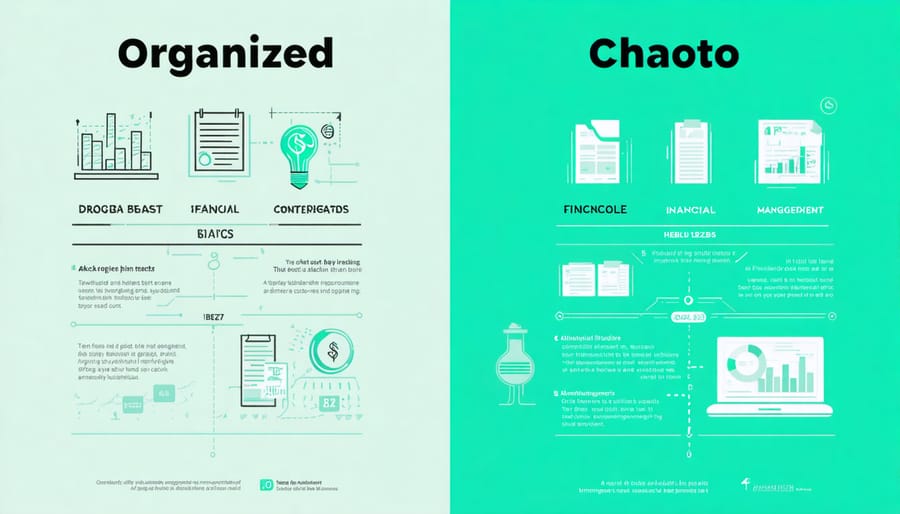
Financial literacy educators are transforming how women approach money management, investment decisions, and long-term wealth building. These passionate professionals bridge the critical knowledge gap between complex financial concepts and real-world application, making money matters accessible to everyone, regardless of their starting point.
As someone who struggled with financial confidence early in my career, I’ve witnessed firsthand how skilled financial educators can illuminate the path to financial independence. They don’t just teach budgeting basics – they empower their students with practical tools, mindset shifts, and actionable strategies that create lasting change.
Today’s financial literacy educators combine traditional teaching methods with modern technology, social media platforms, and personalized coaching approaches to reach diverse audiences. Whether through workshops, online courses, or one-on-one mentoring, these educators are breaking down barriers and dismantling money taboos, particularly for women who have historically been underserved in financial education.
By focusing on relatable examples and real-life scenarios, these educators are creating a new generation of financially savvy individuals ready to take control of their economic future.
Why Financial Literacy Matters for Modern Entrepreneurs
The Real Cost of Financial Uncertainty
Meet Sarah, a talented jewelry designer who almost lost her business due to financial uncertainty. “I was making sales, but I couldn’t understand why I was still struggling to pay bills,” she shares. “It wasn’t until I worked with a financial literacy educator that I realized I had been pricing my pieces all wrong.”
Sarah’s story isn’t unique. According to recent studies, 82% of small businesses fail due to poor cash flow management, while 60% of entrepreneurs admit they’re not confident in their financial decision-making abilities. These statistics paint a sobering picture of how financial knowledge gaps directly impact business success.
Lisa Chen, a successful boutique owner, faced similar challenges: “I was making emotional inventory decisions rather than data-driven ones. Learning to read and understand financial statements transformed how I run my business. Now I know exactly which products drive my profits.”
The real cost isn’t just monetary – it’s the missed opportunities, the stress of uncertainty, and the countless sleepless nights wondering if you’re making the right decisions. But here’s the good news: these challenges are completely avoidable with proper financial education and guidance.

Beyond the Basics: Modern Money Management
In today’s fast-paced digital economy, financial literacy goes far beyond understanding basic budgeting and saving. As a financial educator, I’ve seen how crucial it is to master modern business skills that align with current market demands. Think of digital payment systems, cryptocurrency basics, and automated accounting tools – these are becoming essential parts of our financial toolkit.
I remember when one of my clients, Sarah, struggled with managing her online boutique’s finances because she was stuck using traditional methods. After embracing digital financial tools and modern money management techniques, she transformed her business operations and doubled her revenue within six months.
Today’s financial landscape requires understanding subscription-based business models, digital marketing ROI, and cash flow automation. These skills aren’t just nice-to-have anymore; they’re necessary for survival and growth in our digital economy. The most successful entrepreneurs I work with are those who’ve adapted their financial knowledge to include these contemporary elements while maintaining strong fundamental principles.
Remember, staying current with financial technology isn’t about following trends – it’s about making informed decisions that protect and grow your wealth in an evolving business environment.

The Role of Financial Literacy Educators
Creating Custom Learning Paths
Every financial journey is unique, just like every woman’s path to building your dream business. That’s why savvy financial literacy educators create personalized learning paths that resonate with their clients’ specific needs and goals.
I remember working with Sarah, a talented entrepreneur who felt overwhelmed by traditional financial advice. Her educator crafted a plan that started with the basics of business budgeting before moving into more complex topics like investment strategies and tax planning. This step-by-step approach made all the difference in her confidence and success.
The best educators begin by assessing their clients’ current financial knowledge, personal goals, and learning style preferences. They might use tools like:
• Interactive budget worksheets tailored to individual spending patterns
• Customized milestone tracking systems
• Personal finance apps that align with specific learning objectives
• Real-life case studies relevant to the client’s industry
They also consider factors like time availability, preferred learning methods (visual, hands-on, or theoretical), and cultural background. Some clients thrive with weekly check-ins, while others prefer intensive monthly sessions. The key is flexibility and understanding that financial education isn’t one-size-fits-all.
Regular progress assessments help educators adjust these custom paths as needed, ensuring their clients stay motivated and engaged throughout their financial learning journey.
Building Confidence Through Knowledge
Financial literacy educators understand that confidence often stems from knowledge, which is why they focus on creating a strong foundation of understanding before diving into complex financial concepts. They employ a variety of teaching methods that make financial information accessible and less intimidating, particularly for entrepreneurs who may feel overwhelmed by numbers and spreadsheets.
One approach that’s proven particularly effective is the “learn-practice-teach” method. As Sarah Martinez, a financial educator in Chicago, shares, “When my clients can explain concepts to others, that’s when I know they’ve truly mastered the material and built their confidence.” Educators often encourage their students to start with small, manageable financial decisions and gradually work their way up to more significant ones.
Interactive workshops and real-world simulations help entrepreneurs practice decision-making in a safe environment. These hands-on experiences might include creating sample budgets, analyzing cash flow scenarios, or role-playing investor presentations. The goal is to help participants feel comfortable making financial choices before facing real stakes.
Many educators also incorporate peer learning groups, where entrepreneurs can share experiences and learn from each other’s successes and challenges. This community-based approach helps normalize financial discussions and creates a supportive environment where questions are encouraged and mistakes are viewed as learning opportunities.
Remember, building financial confidence is a journey, not a destination. The best educators provide ongoing support and resources, helping their clients develop both the knowledge and emotional resilience needed for long-term financial success.
Making Financial Education Work for You

Finding Your Perfect Financial Mentor
Finding the right financial mentor is a crucial step in your female entrepreneur’s success journey, and it’s essential to choose someone who aligns with both your values and goals. Start by identifying what specific financial guidance you need – whether it’s investment strategies, business scaling, or personal wealth management.
Look for mentors who have a proven track record in your area of interest and, importantly, experience working with women entrepreneurs. Their teaching style should resonate with your learning preferences. Do they offer one-on-one sessions, group workshops, or a mix of both? Consider how they communicate complex financial concepts – the best mentors make challenging topics accessible without oversimplifying them.
Before committing, take advantage of free introductory sessions or workshop previews. Pay attention to how the mentor interacts with their existing clients and their presence on social media or professional platforms. Are they consistently sharing valuable insights? Do their values align with yours?
Don’t hesitate to ask potential mentors about their approach to financial education. What’s their philosophy on money management? How do they measure success with their clients? A great mentor should be willing to share their own experiences, including both successes and challenges they’ve overcome.
Remember, the right financial mentor isn’t just about credentials – it’s about finding someone who understands your unique journey and can provide tailored guidance to help you achieve your financial goals. Trust your instincts and take time to find someone who truly inspires and motivates you to reach your full potential.
Maximizing Your Learning Experience
As someone who’s been through several financial education programs, I’ve learned that maximizing your learning experience is all about engaging actively and intentionally. Start by setting clear, personal goals for what you want to achieve through financial education – whether it’s mastering investment basics or creating a debt repayment strategy.
Take advantage of every interactive opportunity your program offers. Ask questions during sessions, participate in group discussions, and share your experiences. I’ve found that some of my biggest “aha” moments came from hearing other participants’ perspectives and challenges.
Create a dedicated learning environment for yourself. If you’re taking online courses, designate a specific time and space free from distractions. Keep a financial journal to track your insights, questions, and progress. This personal record becomes invaluable as you implement what you’ve learned.
Don’t hesitate to reach out to your financial educator for clarification. Many offer office hours or additional support channels – use them! Remember, they want you to succeed and understand the material fully.
Practice real-world application immediately. If you learn about budgeting, start creating your budget that same day. When studying investment principles, begin researching potential investments. This immediate implementation helps cement your learning and shows you where you might need additional guidance.
Finally, connect with fellow learners. Whether through study groups or online communities, having accountability partners can significantly boost your motivation and learning retention. Share your wins, discuss challenges, and support each other’s financial journey. Remember, financial literacy is a journey, not a destination, and learning alongside others can make it both more enjoyable and effective.
Taking control of your financial future starts with a single step, and now you have the knowledge to begin that journey with confidence. Financial literacy educators are more than just teachers – they’re guides who can help illuminate the path to financial independence and security. Whether you’re looking to master basic money management or dive deep into investment strategies, remember that learning is a continuous process, and it’s never too late to start.
As we’ve explored throughout this article, the right financial educator can make a world of difference in your money journey. Take time to research potential mentors, engage with their content, and don’t hesitate to ask questions. Your financial education is an investment in yourself that will pay dividends for years to come.
I encourage you to take action today: identify one area of your finances you’d like to improve, seek out a qualified educator who resonates with your learning style, and commit to taking those first steps. Remember, every financial expert started as a beginner, and your future self will thank you for starting this journey now. Together, let’s build a community of financially empowered women who support and inspire each other to achieve their money goals.



